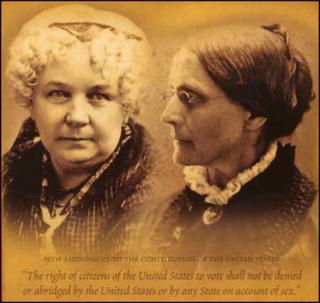Witch Hunt in Women's Studies
Yesterday, a friend of mine forwarded this article from Women's eNews. I also noticed that Jessica already blogged about this at feministing. I live in PA, whose House was the first to adopt the Academic Bill of Rights (ABOR) and I have definitely had exposure to the Students for Academic Freedom platform of seeking legal remedies for courses they find to have a liberal biases. Its not fun. You feel like you are part of a witch hunt. In my experience, the students who make accusations of "liberal bias" against courses or professors haven't necessarily taken the course or had a conversation with the "offending" faculty member.
Here is my incomplete list of what is just plain wrong with this movement (I would love to hear from others):
1. It is disengenous. Those pushing the ABOR in state legislatures or on campuses use the language of "academic freedom" or "diversity" to then persuade state or local governments to engage in censorship.
2. ABOR supporters make the fallacious leap that if the content of your course is critical of the status quo; offers viewpoints deemed "liberal;" or bears on current political issues, even they are not obviously (to them that is) related to the content, then such course is indoctrinating. This point merits further discussion. Do the conservative groups that support this bill really think teaching Marx, John Dewey, Auguste Comte, or Betty Friedan is that threatening? PLEASE. What are there subliminal messages buried in these texts that colonize the minds of students? Btw, have many of these students read Marx's Capital? It is hardly the pornographic text they make it out to be.
3. When you try to have a rational discourse with many of the conservative students who support this bill, they tend to use victim language. Rather than debate the substance of this proposal, they garner sympathy for their cause by telling horrendous stories of liberal professors who made them feel uncomfortable by disagreeing with their support of the war. I am all for a real discussion of FREE SPEECH. I am also quite sympathetic to those who actually have been discriminated against for their views. But, mostly what I hear is overblown stories. I take OFFENSE that the victim language used by these students, or the stories posted on the SAF website, are implicity suggesting that experience of being in the class of a liberal professor is like rape or some other horrendous trauma that destroys your sense of security, or your self-esteem.
Because I imagine that I will continue to be hunted and scrutinized by these forces on campus, I opened my first class with a discussion of whether or not Women's Studies is a subject matter geared toward indoctrinating you. It was an interesting debate, wherein I mostly adopted the role of defending the ABOR (after all I am a philosopher, so I am going to take the opposite side of whatever view seems to be winning out).
I have no idea what is in store this year? What will come of the September hearings in PA over House Resolution 177?
However, it is clear to me that the inspiration for this witch hunt in Women's Studies, which no doubt will go after any heterodox economist, sociologist, area studies, Peace and Justice studies program (who have I left out?) is the Powell Memo.
Written in 1971, Lewis Powell gave the game plan for how to turn the national discourse back to conservative views. Here are two snippets from this memo to muse on:
The most disquieting voices joining the chorus of criticism come from perfectly respectable elements of society: from the college campus, the pulpit, the media, the intellectual and literary journals, the arts and sciences, and from politicians. In most of these groups the movement against the system is participated in only by minorities. Yet, these often are the most articulate, the most vocal, the most prolific in their writing and speaking.
Now, for Powell's strategy:
What Can Be Done About the Campus
The ultimate responsibility for intellectual integrity on the campus must remain on the administrations and faculties of our colleges and universities. But organizations such as the Chamber can assist and activate constructive change in many ways, including the following:
Staff of Scholars
The Chamber should consider establishing a staff of highly qualified scholars in the social sciences who do believe in the system. It should include several of national reputation whose authorship would be widely respected -- even when disagreed with.
Staff of Speakers
There also should be a staff of speakers of the highest competency. These might include the scholars, and certainly those who speak for the Chamber would have to articulate the product of the scholars.
Speaker's Bureau
In addition to full-time staff personnel, the Chamber should have a Speaker's Bureau which should include the ablest and most effective advocates from the top echelons of American business.
Evaluation of Textbooks
The staff of scholars (or preferably a panel of independent scholars) should evaluate social science textbooks, especially in economics, political science and sociology. This should be a continuing program.
The objective of such evaluation should be oriented toward restoring the balance essential to genuine academic freedom. This would include assurance of fair and factual treatment of our system of government and our enterprise system, its accomplishments, its basic relationship to individual rights and freedoms, and comparisons with the systems of socialism, fascism and communism. Most of the existing textbooks have some sort of comparisons, but many are superficial, biased and unfair.
We have seen the civil rights movement insist on re-writing many of the textbooks in our universities and schools. The labor unions likewise insist that textbooks be fair to the viewpoints of organized labor. Other interested citizens groups have not hesitated to review, analyze and criticize textbooks and teaching materials. In a democratic society, this can be a constructive process and should be regarded as an aid to genuine academic freedom and not as an intrusion upon it.
If the authors, publishers and users of textbooks know that they will be subjected -- honestly, fairly and thoroughly -- to review and critique by eminent scholars who believe in the American system, a return to a more rational balance can be expected.
Equal Time on the Campus
The Chamber should insist upon equal time on the college speaking circuit. The FBI publishes each year a list of speeches made on college campuses by avowed Communists. The number in 1970 exceeded 100. There were, of course, many hundreds of appearances by leftists and ultra liberals who urge the types of viewpoints indicated earlier in this memorandum. There was no corresponding representation of American business, or indeed by individuals or organizations who appeared in support of the American system of government and business.
Every campus has its formal and informal groups which invite speakers. Each law school does the same thing. Many universities and colleges officially sponsor lecture and speaking programs. We all know the inadequacy of the representation of business in the programs.
It will be said that few invitations would be extended to Chamber speakers.11 This undoubtedly would be true unless the Chamber aggressively insisted upon the right to be heard -- in effect, insisted upon "equal time." University administrators and the great majority of student groups and committees would not welcome being put in the position publicly of refusing a forum to diverse views, indeed, this is the classic excuse for allowing Communists to speak.
The two essential ingredients are (i) to have attractive, articulate and well-informed speakers; and (ii) to exert whatever degree of pressure -- publicly and privately -- may be necessary to assure opportunities to speak. The objective always must be to inform and enlighten, and not merely to propagandize.
Balancing of Faculties
Perhaps the most fundamental problem is the imbalance of many faculties. Correcting this is indeed a long-range and difficult project. Yet, it should be undertaken as a part of an overall program. This would mean the urging of the need for faculty balance upon university administrators and boards of trustees.
The methods to be employed require careful thought, and the obvious pitfalls must be avoided. Improper pressure would be counterproductive. But the basic concepts of balance, fairness and truth are difficult to resist, if properly presented to boards of trustees, by writing and speaking, and by appeals to alumni associations and groups.
This is a long road and not one for the fainthearted. But if pursued with integrity and conviction it could lead to a strengthening of both academic freedom on the campus and of the values which have made America the most productive of all societies.
Graduate Schools of Business
The Chamber should enjoy a particular rapport with the increasingly influential graduate schools of business. Much that has been suggested above applies to such schools.
Should not the Chamber also request specific courses in such schools dealing with the entire scope of the problem addressed by this memorandum? This is now essential training for the executives of the future.
"The Chamber." I wish it were just a science-fiction dystopia novel.








